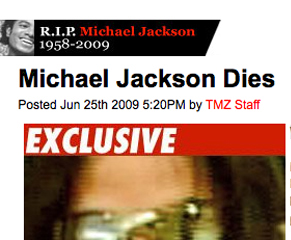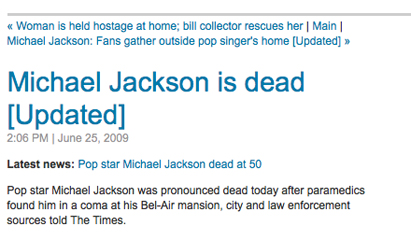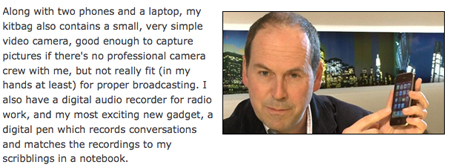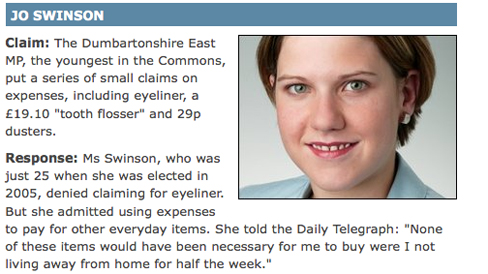Last week the National Union of Journalists (NUJ) sent an eight-point plan to new culture secretary Ben Bradshaw as an economic stimulus package for the UK’s local media.
In summary:
- Reform of cross-media ownership rules with a strengthened public interest test;
- Hard and fast commitment to ring-fence licence fee funding for the BBC;
- A levy introduced on commercial operators who benefit from quality public service content – including local news – but do not contribute to its production;
- Tax breaks for local media who meet clearly defined public purposes;
- Tax credits for individuals who buy quality media;
- Direct support to help establish new genuinely local media organisations;
- Strategic use of central and local government advertising;
- Support for training opportunities that open access to journalism
The proposals come ahead of the long-awaited Digital Britain report, part of which will make new suggestions for local media ownership models and provision.
Both, of course, come on top of a select committee inquiry into local media, countless pontifications from media commentators (ourselves included) and lobbying by industry groups of Bradshaw’s predecessor Andy Burnham.
Reactions to the NUJ’s suggestions from a range of industry representatives are featured below – Journalism.co.uk wanted to gauge the feeling on the ground, so to speak (feel free to leave more comments below or email laura at journalism.co.uk).
Having spoken to Society of Editors executive director Bob Satchwell as part of this process, one thing is clear: new ideas are needed to support newsgathering at a local level, whatever shape or platform it takes.
But with the current level of pressure on existing local news providers, it is short-term answers that are needed, says Satchwell:
“While we’re waiting to create new models to deal with new media landscape the existing reality may be so seriously damaged that it may be too late to apply those complex solutions.”
Here are some reactions to the NUJ’s proposals – what’s the next step?
Firstly starting with a comment left on our original post by James Goffin on levies for aggregators:
Presumably ‘A levy introduced on commercial operators who benefit from quality public service content – including local news – but do not contribute to its production’ is aimed at people like Google, but why leave it there – and why only in one direction?
If this is genuinely aimed at supporting local media (and not just shoring up the BBC, which tends to be the NUJ line nationally) then why shouldn’t the corporation be charged when it ‘benefits’ from stories it has followed up from the local press? (Or blogs for that matter).
And much as I enjoy the idea of claiming back my Private Eye subs against tax, I can see it being as effective in stimulating the economy as the VAT cut.
Give them some credit for at least trying; pity most of it is nonsense.
Tom Calver, a communications officer for Blackburn with Darwen County Council, on defining ‘quality’ and a plan for mutually owned local newspapers:
Point 7 calls for us to consider ‘quality journalism’ when we place ads, which puts those of us in council comms in the unenviable position of having to decide what constitutes ‘quality’. Does the NUJ really think we should be doing that? In any case, there is only one local paper here, so I don’t have any choice in which title to use anyway.
What guarantee is there that ad spend would really support quality journalism, rather than just boosting profits while the newsroom is still run down?
I’m also slightly confused as to what’s meant by “identifying appropriate targets”. Generally speaking, my targets are groups of local people. If a local paper is a good way to reach them, I’ll use it. If it’s not, then I’d be wasting taxpayers money, and failing to get the message to the right people. So is the suggestion that only people who read the local paper are appropriate targets for any campaign?
Or is the suggestion that ‘appropriate targets’ are ‘deserving’ newspapers which should be supported in some sort of charitable way? I’d understand that if local papers were not-for-profit with a clear commitment to good journalism and informing local people, but they’re owned by large groups who will look after the bottom line long before they look after quality journalism.
The NUJ just has not gone far enough. It is asking for more money to be chucked at the same failing model, albeit with some loose guarantees about quality from the same groups that have cut back in newsrooms. That might slow the decline, but it won’t turn things around.
How about mutual ownership for local papers? Newspaper staff, local people and those who support quality journalism could all be members. A constitution could guarantee day to day editorial independence, but the editor would answer to a board elected from the membership, which would set parameters for coverage, monitor quality and ensure investment in training.
That sort of organisation could then benefit from tax breaks and have access to funds supporting community development. With a clear duty to improve local coverage, it would probably get back some of the lost readers (and so make itself a more appealing advertising channel for public services!).
Rick Waghorn, ex-regional newspaper journalist and founder of MyFootballWriter.com on practical problems:
I think it’s all very well intentioned, but as ever the devil will be in the detail and the ‘how’ any of this is likely to work…
Or, indeed, who is going to have the political will/leverage to ensure any of this is adhered to.
Tax credits? Who adjudicates on the ‘quality’ assessment panel?
Direct support for ‘genuinely’ local media organisations? How? When? Via whom? Ofcom?
Strategic use of local and central government advertising is spot on – but that can start happening now. But again who is charged with making the ‘assessment’ that it is ‘quality’ journalism?
With Tom Watson out of government, Ben Bradshaw presumably given 10 days to master his new ‘brief’ before the publication of Digital Britain, I don’t see anyone with the drive or the will to oversee this – not whilst the Brown government is so fatally weakened.
Alas, I fear it’s going to be every man, woman and under-fire journalist for themselves for the foreseeable future – and the only people that are ever going to come to our rescue are ourselves.
Former editorial director for a UK regional newspaper group on media ownership problems:
My own concerns would be about possible loss of independence that could come with subsidy.
The cut backs in the industry are already leaving gaps. It might be better to see who and what steps in to fill the vacuum. [More emphasis on new media models – Ed]
On cross media ownership, take a look at Guardian Media in Manchester where it has already happened with TV, radio, web and newspapers under one roof. It has not been a success.
Comment from Dan Mason, director of Dan Mason Associates and former newspaper group managing editor, on journalism enterprise:
Full marks to the NUJ for keeping the ball rolling after the departure of Andy Burnham. I’m delighted to see the appalling lack of support for media innovation and enterprise included (this would top my list), as well as the need to focus on better media training.
My big concern is that trying to define something as subjective as ‘quality journalism’ as a cornerstone of any plan renders it impotent from the start, especially when the suggested criteria includes demands on media companies that are impossible to regulate, like maintaining paginations.
If this keeps the dialogue going and pressure on this government to act, great. But, if Lord Sugar has anything to say about it, ministers will need to focus on what can be achieved, by when, for what cost.









